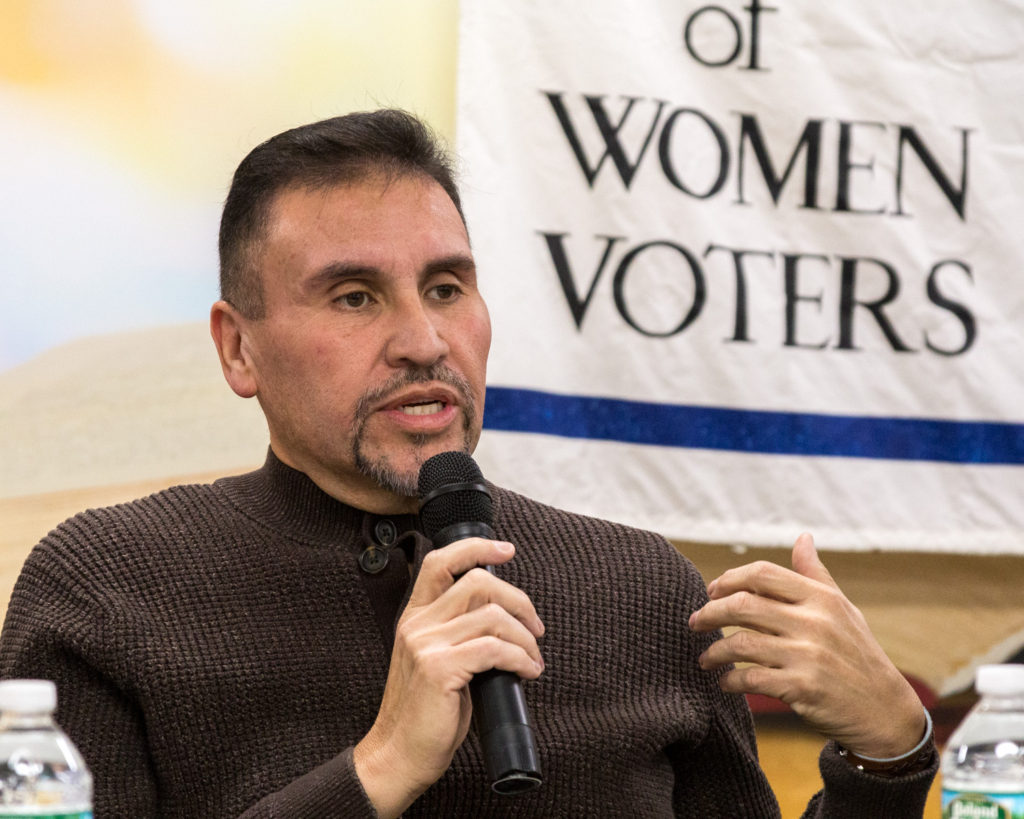The New Britain Racial Justice Coalition said, on July 29, 2020, that its members, “strongly condemn Senator Gennaro Bizzarro for voting against the,” recently approved police accountability law.

Gov. Ned Lamont (D-CT) signed the police accountability legislation into law today, July 31, 2020, saying. “These reforms are focused on bringing real change to end the systemic discrimination that exists in our criminal justice and policing systems that have impacted minority communities for far too long.”
Lamont’s office said that purpose of the legislation is, “to increase accountability for law enforcement whose actions do not represent the values of the state and to increase public trust with police officers. The long-term issue came back to the forefront this spring in the wake of the tragic deaths of George Floyd and Breonna Taylor, among many others, by some police and law enforcement.”
“Ultimately, what we are enacting today are policies focused on providing additional safeguards to protect peoples’ lives and make our communities stronger,” Lamont said. “Our nation and our state has been having a conversation on this topic for decades, and these reforms are long overdue.”
The New Britain Racial Justice Coalition said that it, “welcomes the passage of this bill, while also acknowledging its shortfalls,” saying that it, “cautiously welcomes the passage of ‘An Act Concerning Police Accountability’.”
Alicia Strong, co-founder of the Coalition, said that, “We are pleased that the bill provides legal language that allows towns to create Civilian Review Boards with subpoena powers, as we have been pushing this in City Hall for the last month. Nonetheless, this bill will significantly increase police funding and we firmly believe in the defunding and reallocating of police funds towards education and social services.”
When the State House of Representatives approved of the legislation on July 23rd, State Representative Rick Lopes (D-24), State Representative Bobby Sanchez (D-25) and State Representative Peter Tercyak (D-26) voted in favor, while State Rep. William Petit (R-22) voted in opposition.

Despite the State Senate, overall, approving it on July 29th, 21 to 15, Sen. Gennaro Bizzarro (R-6), whose district primarily includes New Britain, voted against the legislation. Bizzarro, who is also the Corporation Counsel for the city of New Britain in the administration of Mayor Erin Stewart (R-NB), had said that he was concerned that the legislation would increase the number of lawsuits against cities and towns.
But Bizzarro’s vote vote drew condemnation from the Coalition, saying that, “The Coalition plans to hold Senator Bizzarro accountable in the upcoming elections.”
“If we want democracy to work for everyday people, we must be committed to holding our elected officials accountable,” the statement on the Coalition’s website quotes Tre Brown, co-founder of the New Britain Racial Justice Coalition, as saying. “If you don’t represent the people’s interest when you have the chance, then you will not be re-elected.”

In a statement on June 8th, before consideration of the police accountability bill, Lopes, Sanchez and Tercyak had said that,
We are committed to passing legislation in special session that addresses police brutality caused by systemic racism. Alongside colleagues in the Black and Puerto Rican Caucus, we will not rest until we begin to see major laws on the books to combat our state’s history of unequal treatment of communities of color, and substantial progress is made to ensure every resident in our state has equal access to education, healthcare and economic opportunity as well as the enactment of reforms to our criminal justice system.
The sweeping police accountability legislation, makes a large number of changes to the laws concerning policing in the state.
The new law explicitly provides that the local legislative bodies, the City Council in New Britain, would have the power to create a civilian police review board, saying that,
The legislative body of a town may, by ordinance, establish a civilian police review board. The ordinance shall, at a minimum, prescribe: (1) The scope of authority of the civilian police review board; (2) the number of members of the civilian police review board; (3) the process for the selection of board members, whether elected or appointed; (4) the term of office for board members; and (5) the procedure for filling any vacancy in the membership of the civilian police review board.
The new provision would apparently override the City Charter of New Britain, which makes all local commission appointments by the mayor, alone. The new law appears to empower the City Council to decide how the civilian police review board would be elected or appointed and how vacancies on the board would be filled.

The new law goes on to give such a civilian police review board the power to,
(1) Issue subpoenas to compel the attendance of witnesses before such board; and (2) require the production for examination of any books and papers that such board deems relevant to any matter under investigation or in question.
The legislation sets new limits on police “frisking” and on searches of motor vehicles. The bill also, according to the Office of Legislative Research, “expands the requirement to use body cameras to police officers,” and, “requires these officers to use dashboard cameras in police patrol vehicles.”
The law, according to the Office of Legislative Research, “Limits the circumstances when a law enforcement officer’s use of deadly physical force is justified and establishes factors to consider in evaluating whether the officer’s action was reasonable,” and “Establishes when the use of chokeholds and similar restraints is justified.”

The new law changes the way police use of force investigations work in the state from being by regional prosecutors, who work regularly with police departments, to a new Office of the Inspector General, who would have the power to investigate police officers and prosecute in cases of misconduct.
The legislation also creates an increased penalty for making false reports to police or false 911 calls,
with specific intent to falsely report another person or group of persons because of the actual or perceived race, religion, ethnicity, disability, sex, sexual orientation or gender identity or expression of such other person or group of persons.
The law changes the membership of the Police Officer Standards and Training Council (POST), according to the Office of Legislative Research, by “(1) adding a member to the council, (2) reducing the number of gubernatorial appointments from 17 to 11 and adding six legislative appointments, and (3) requiring representation from additional stakeholders.”
The legislation allows POST to revoke its certificate to be a police officer if an officer,
has been found by a law enforcement unit … to have engaged in conduct that undermines public confidence in law enforcement, including, but not limited to, discriminatory conduct, falsification of reports or a violation of the Alvin W. Penn Racial Profiling Prohibition Act
The new law prevents police union contracts from stopping, “the disclosure of disciplinary matters or alleged misconduct” by police officers under the State’s Freedom of Information laws.
The legislation mandates that,
Not later than January 1, 2021, and annually thereafter, the board of police commissioners, the chief of police, the superintendent of police or other authority having charge of a law enforcement unit that serves a community with a relatively high concentration of minority residents shall report to the Police Officer Standards and Training Council on the community’s efforts to recruit, retain and promote minority police officers.
The new law bans the acquisition by police departments of,
military designed equipment … that is (A) a controlled firearm, ammunition, bayonet, grenade launcher, grenade, including stun and flash-bang, or an explosive, (B) a controlled vehicle, highly mobile multi-wheeled vehicle, mine-resistant ambush-protected vehicle, truck, truck dump, truck utility or truck carryall, (C) a drone that is armored or weaponized, (D) controlled aircraft that is combat configured or combat coded or has no established commercial flight application, (E) a silencer, (F) a long-range acoustic device, or (G) an item in the federal supply class of banned items.
The legislation requires police departments to report this military equipment that they already have to the state legislature by December 31, 2020.
The legislation includes numerous other parts, including provisions for behavioral health assessments and substance abuse testing of police officers, provisions for statewide crowd management policies and a requirement for implicit bias training for all police officers.




